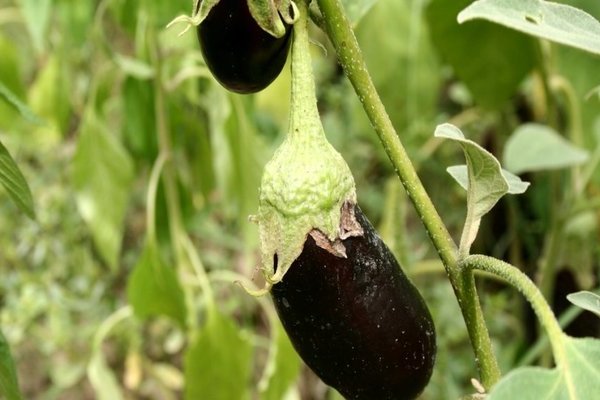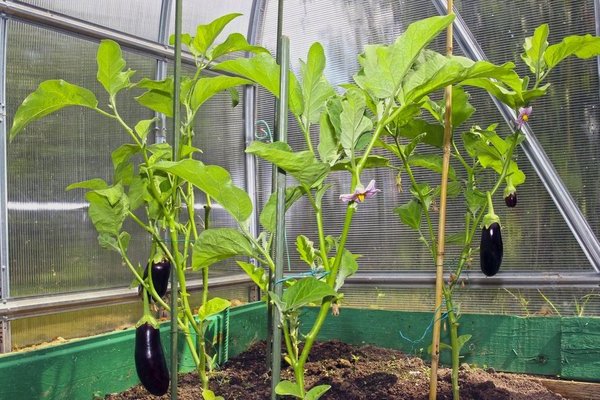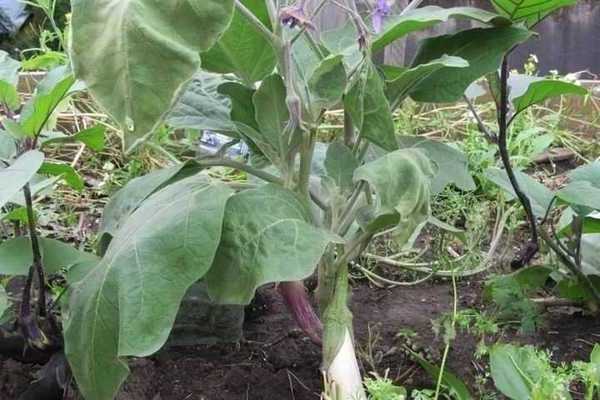Eggplants grow poorly: causes, their elimination
Content:
The article discusses in detail the question "eggplants grow poorly": causes, their elimination, prevention, recommendations for growing crops.
Eggplants are considered a capricious crop that love warmth and light, nutritious soil. But, despite this, the cultivation of this healthy and tasty crop is in great demand and attention among farmers and gardeners. If a bad harvest is brewing, then this means that you are doing something wrong.
Eggplants grow poorly: possible causes of the problem, their elimination

Eggplants grow poorly: possible causes of the problem, their elimination
Let's look at the most common and important reasons for the poor growth of this plant:
1. Incorrect eggplant transplant. As mentioned above, eggplants are capricious and love warmth, therefore, if the soil turned out to be cold during planting (below 20 degrees), this culture will grow poorly. Eggplant tolerates heat much more easily than cold. It is necessary to plant seedlings in pits, 10-15 cm deep, and leave a distance of up to 60 cm between them. After planting, the soil is mulched and the plant is covered with non-woven material.
2. Incorrect supplementary lighting of seedlings. Since often, the seedlings may not have enough light, gardeners resort to supplementary lighting of the seedlings with special lamps, doing this sometimes, incorrectly, they overdo it. You need to know that additional lighting will be enough for eggplants and 10 hours a day.
3. Wrong pick. Eggplants are not lovers of picking, so after it they can grow poorly, and if they accidentally damage the roots, then the growth and development of the plant will significantly decrease (up to about 2 weeks). Therefore, it is better to take the advice and initially plant the eggplants in separate containers. And when landing in open ground, it will be easier later (just transfer them together with the ground into the hole).
4. Low air temperature. The ideal air temperature for the growth of this plant is from +25 to +28 degrees. Many varieties of eggplant do not set the ovary when the temperature drops and can shed the fruits that have already appeared. Therefore, if the temperature is lower than favorable for this plant, then it will be better to plant them in a greenhouse or greenhouse.
5. Little light in the garden. Eggplant has large leaves, they shade each other, so you need to highlight them from below. To do this, you can mulch the soil with any reflective material.
6. Flowering occurs in the shade. It is very important that when the culture begins to bloom, the flowers are in the sun, otherwise they will fall off. Be sure to remove excess leaves and other causes of shading.
7. Incorrect soil mulching. The reason for poor eggplant growth may be the soil, or rather improper mulching. Suppose mulching the ground with sawdust. This can lead to acidification of the soil, as a result - the leaves turn yellow and the fruit does not set. It is better to use rotted sawdust, they will not harm this culture.
8. Stuffiness. If the air in the greenhouse is too humid, there is a possibility of contamination of the eggplant with harmful insects such as aphids, as well as other diseases such as black leg. Therefore, it is imperative to ventilate in a greenhouse or greenhouse.
9. Drafts. Airing in a greenhouse or greenhouse, of course, is necessary, but do not overdo it. Avoid drafts.
Eggplants grow poorly: mistakes when feeding, watering

Eggplants grow poorly: mistakes when feeding, watering
1. Lack or absence of feeding.For good growth, the plant requires a sufficient amount of minerals. Primarily potassium and phosphorus. Eggplant fertilizing is carried out 3 to 5 times per season, depending on the soil, in the following sequence: The first is carried out 20 days after sowing in order to strengthen the plant (10 grams of superphosphate is mixed with 30 grams of potassium nitrate, all this is diluted in 10 liters of water) ... The second feeding takes place during transplantation (mix 70 grams of superphosphate with 30 grams of potassium sulfate, dilute everything in 10 liters of water). You can also apply complex fertilizers in granules or powders. The third feeding takes place during flowering. To do this, use a solution in a ratio of 1: 5 (30 grams of superphosphate, 10 grams of potassium sulfate, 20 grams of urea and 10 liters of water), with water. And, the last feeding, when the fruits are formed. A solution is used (10 liters of water and 40 grams of superphosphate) once every 10 days.
2. Lack of moisture. For eggplant, moderate watering is needed, with warm water at the root. You can water the plants once a week, if you take care in advance and mulch the bed with peat or straw (they will keep moisture in the ground). Otherwise, you will have to water the eggplants every other day.
3. Improper watering. When watering, try not to get water on the eggplant foliage, otherwise there is a risk of contracting a fungal disease.
4. Excess organic matter. If you overdo it with organic fertilizers, then there will be an increase in green mass, the fruits will not form. But if this happens, then pour the plant with a solution of potassium sulfate, for 10 liters of water, 1.5 tablespoons. Or you can also add half a glass under the eggplant bush of wood ash.
5. Lack of nutrients. With a lack of nutrients, or irregularity of their introduction, eggplants will not only grow poorly, but also hurt. Usually, to determine what kind of deficiency of substances, they look at the plants. With a lack of nitrogen, the leaves are small, gradually turning white or light yellow. You can eliminate the lack of nitrogen as follows: with a urea solution (150 grams per 10 liters of water). With a lack of phosphorus, large leaves turn yellow, with the appearance of dark spots, then the leaves fall off. You can eliminate the lack of phosphorus with superphosphate, 150 grams for 10 liters of water. With a lack of magnesium and potassium, the leaves may turn yellow, and holes may also appear. You can eliminate the lack of potassium and magnesium by adding wood ash or magnesium sulfate to the soil.
Why eggplants grow poorly: other reasons

Why eggplants grow poorly: other reasons
Incorrect crop rotation.Avoid planting eggplant after crops such as potatoes, peppers or tomatoes, or plants from related crops.
Diseases and pests.In rainy and cool weather, this crop can attack fungal, viral and infectious diseases. For example, a viral mosaic, dark and light spots come out on the foliage. The disease leads to yellowing and deformation of the plant, a decrease in the number of ovaries. A great danger to eggplants is the bacterial disease black spot, which appears when the air humidity is high. Dark spots appear on the leaves, and then on the fruits.
Eggplant grows poorly: what to do to prevent infection
To protect the plant from infections, a number of measures are used.
- Harvest only healthy seeds.
- Disinfect the soil for seedlings and at the place of disembarkation.
- Compliance with the rules of crop rotation.
- Compliance with the rules of agricultural technology.
- Remove plant residues on the ridges.
If the plant does get sick, then it is treated with chemical and biological preparations, special feeding and disinfecting equipment.
Care features
Much labor is not required to grow and care for this crop. All you need is correct, timely feeding and adherence to the above rules. Consider some simple feeding rules:
1. Be sure to follow the instructions for use of ready-made mixtures.
2.To ensure the balance of nutrients in the soil, be sure to alternate mineral and organic fertilizers.
3. Carry out top dressing only after watering the plant, it is better to do this early in the morning or in the evening.
4. When watering the crop, do not let water get on the leaves.
Conclusion
Eggplant is a difficult and whimsical crop to grow. Not only seedlings may grow poorly, but already mature bushes may not be tied. To avoid this, you just need to adhere to the rules and tips listed above and take proper care of this fastidious culture. Then this plant will delight you with a good and tasty harvest.
Eggplant grows poorly

